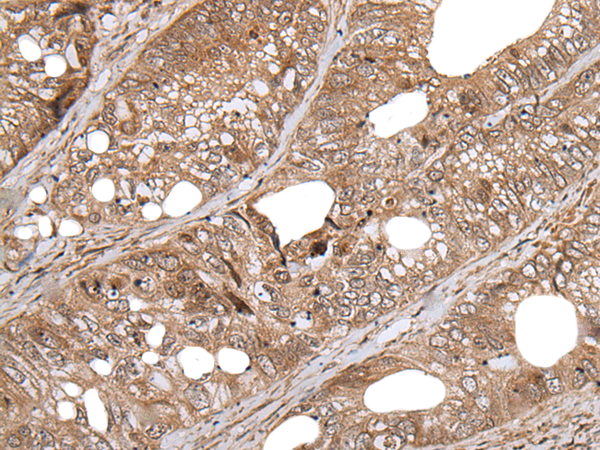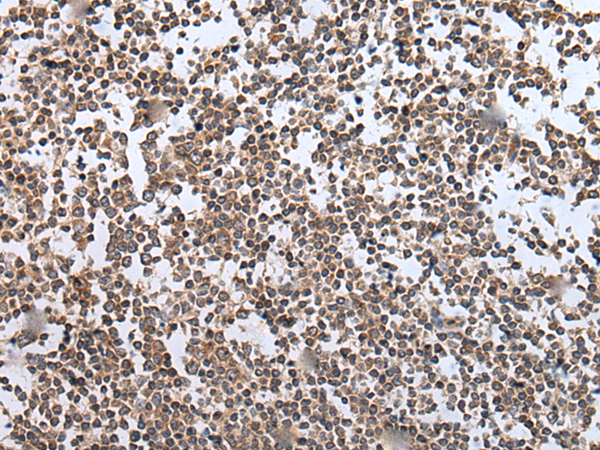

| WB | 咨询技术 | Human,Mouse,Rat |
| IF | 咨询技术 | Human,Mouse,Rat |
| IHC | 1/25-1/100 | Human,Mouse,Rat |
| ICC | 技术咨询 | Human,Mouse,Rat |
| FCM | 咨询技术 | Human,Mouse,Rat |
| Elisa | 1/5000-1/10000 | Human,Mouse,Rat |
| Aliases | BS; RECQ2; RECQL2; RECQL3 |
| Host/Isotype | Rabbit IgG |
| Antibody Type | Primary antibody |
| Storage | Store at 4°C short term. Aliquot and store at -20°C long term. Avoid freeze/thaw cycles. |
| Species Reactivity | Human |
| Immunogen | Synthetic peptide of human BLM |
| Formulation | Purified antibody in PBS with 0.05% sodium azide and 50% glycerol. |
+ +
以下为3篇涉及BLM抗体的相关文献摘要信息,供参考:
1. **"Characterization of a monoclonal antibody specific for the Bloom's syndrome gene product, BLM"**
*作者:M. S. Ellis等*
摘要:该研究报道了一种针对BLM蛋白的单克隆抗体的开发与验证。通过免疫印迹和免疫荧光证实该抗体可特异性识别BLM蛋白,并用于研究BLM在DNA损伤修复中的亚细胞定位。
2. **"BLM protein expression in primary colorectal cancer cells: correlation with microsatellite instability"**
*作者:K. S. Wang等*
摘要:利用商业BLM抗体分析结直肠癌组织中BLM蛋白表达水平,发现其缺失与微卫星不稳定性(MSI)呈显著负相关,提示BLM缺陷可能导致基因组不稳定性。
3. **"Functional analysis of BLM helicase using RNA interference and specific antibody blocking"**
*作者:A. R. Meetei等*
摘要:通过抗体阻断实验结合RNA干扰技术,证明BLM蛋白在维持端粒稳定性和同源重组修复中的双重功能,抗体特异性验证包括免疫共沉淀及体外功能抑制实验。
注:实际文献需通过PubMed或Web of Science等平台检索,建议结合具体研究方向筛选近年高引论文。
The BLM antibody is a crucial tool in studying the Bloom syndrome protein (BLM), encoded by the BLM gene, which belongs to the RecQ helicase family. BLM plays a vital role in maintaining genomic stability by resolving complex DNA structures during replication and repair. Mutations in the BLM gene cause Bloom syndrome, a rare autosomal recessive disorder characterized by growth retardation, immunodeficiency, sun-sensitive skin lesions, and a heightened predisposition to cancers. Patients exhibit genomic instability, notably elevated sister chromatid exchanges (SCEs), reflecting impaired DNA repair mechanisms.
BLM antibodies are widely used in research to detect and quantify BLM protein expression via techniques like Western blotting, immunofluorescence, and immunohistochemistry. They help investigate BLM's interactions with other DNA repair proteins (e.g., BRCA1. RAD51) and its role in suppressing tumorigenesis. Researchers also utilize these antibodies to study BLM's involvement in replication stress response, telomere maintenance, and meiosis. Commercially available BLM antibodies are produced by various companies, including Santa Cruz Biotechnology, Abcam, and Cell Signaling Technology, with validation data ensuring specificity for human, mouse, or other model organisms. Their application extends to cancer research, particularly in understanding BLM dysregulation in malignancies and potential therapeutic targeting.
×